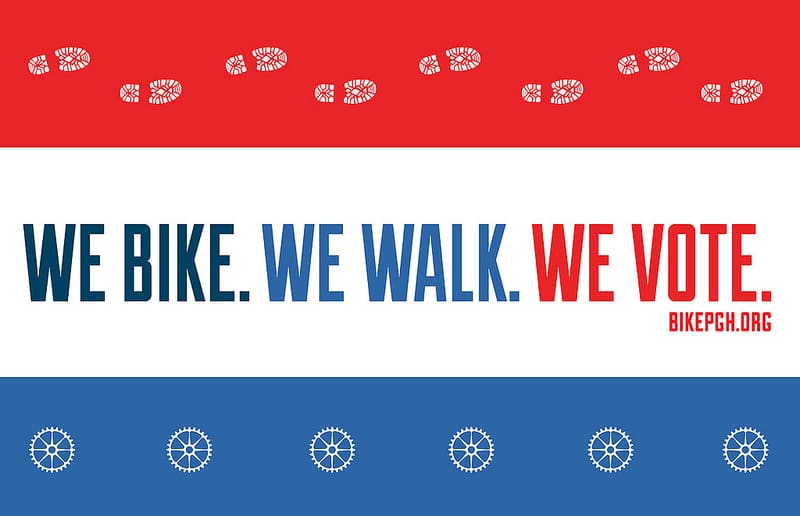
Allyson Schwartz answers questions on biking and walking
Tuesday, May 20, is primary day in Pennsylvania.
Our elected officials play critical roles in funding safe streets and better bicycling, and it’s important that those who bike and walk get out and vote.
Similar to our mayoral We Walk, We Bike, We Vote campaign, we collaborated with the Greater Philadelphia Bicycle Coalition and PA Walks and Bikes to send a questionnaire to the four candidates running for the Democratic nomination in the Pennsylvania gubernatorial race. The governor is an extremely important person in setting the state’s transportation priorities. We encourage all registered Democrats to vote in the primary on Tuesday, and we encourage everyone to vote in the general election in November.
We will be publishing the candidates’ responses here between now and Monday. Click here for background on this project and the questions.
 Candidate: Allyson Schwartz
Candidate: Allyson Schwartz
Website: allysonschwartz.com
Twitter: @allysonschwartz
Facebook: /allysonschwartzforgovernor
Questionnaire:
In the state of Pennsylvania, 12% of all traffic fatalities are bicyclists and pedestrians. While overall traffic fatalities are decreasing, bicycle and pedestrian deaths are not. Unlike our peers in New Jersey, Delaware, Maryland, New York or almost any other state in the country, PennDOT does not have a bicycle and pedestrian office.
1. What value do you see is in encouraging biking and walking in Pennsylvania?
I am a bicyclist myself. As a member of both the Livable Communities Task Force and the Congressional Bike Caucus in the U.S. House, one of my top priorities has been to improve neighborhoods in Pennsylvania and across the country by making areas greener, safer, more livable and more bike-and-pedestrian friendly.
I have built a strong, proven record of working to encourage biking and walking in Pennsylvania. The benefits are obvious and many. They include improved health and lower healthcare costs; less traffic congestion, reduced air pollution, and less greenhouse gas emissions.
I have been an advocate – and have helped to provide funding – for The Circuit bike/ped trail in the Philadelphia area. In October 2012, I helped to break ground for the Port Richmond Trail along the Delaware River in Northeast Philadelphia. As a member of Congress, I helped obtain the federal TIGER grant that made the project possible.
Altogether, I have helped secure $23 million in TIGER grants for 16.3 miles of pedestrian and bicycle facilities in the Philadelphia area. These miles are part of a 128-mile circuit crossing through six counties in southeastern Pennsylvania and southern New Jersey. Eventually, The Circuit could encompass 500 miles. We are getting it done, piece by piece.
2. Will you set a goal to reduce pedestrian and bicycle fatalities by half by 2025?
Our streets belong to all of our citizens, and that certainly includes pedestrians and cyclists. To both encourage bicycle commuting and to make our streets safer, Pennsylvania should adopt a Complete Streets policy.
Complete Streets policies balance the needs of cars, pedestrians, and cyclists with dedicated space for each. The City of Philadelphia in 2009 adopted a complete streets policy that has made a real difference on the ground level. Complete Streets advocates have made a push for such a program in Pittsburgh.
As governor, I will adopt a state Complete Streets policy that encourages and supports local communities in adopting Complete Streets plans. I cannot forecast whether this program, together with other pro-bike, pro-walking measures, will lead to a 50 percent reduction in fatalities. But it will certainly make a difference.
I will meet with stakeholders to consider whether Pennsylvania’s mandatory bicycle helmet law should be amended to protect more of our youth. The current law requires helmet use by riders 12 and under. Among our neighbor states, only Ohio (which has no mandatory helmet law) does less to protect teenage riders. New Jersey covers riders 17 and younger; Delaware, 16 and under; West Virginia, 15 and under; and New York, 14 and under.
3. PennDOT needs to establish a bicycle and pedestrian office that is adequately staffed to:
- update PennDOT design manuals and train PennDOT engineers in current bicycle and pedestrian best practices,
- update and monitor the statewide bicycle and pedestrian master plans,
- assist MPOs, counties and municipalities in drafting bicycle and pedestrian master plans,
- develop a data-driven cost estimate of building out all proposed bicycle and pedestrian facilities, trails and bicycle routes statewide that can be included in the Long Range Transportation Plan.
Will you establish such an office?
Yes.
4. Will you ask PennDOT and DCNR to set 10-year goals for the number of miles of bike lanes and trails to be built across Pennsylvania?
Yes.
5. Will you support spending a percentage of federal Transportation Alternatives Program funds and Pennsylvania’s Multi-Modal Fund on Safe Routes to School projects?
I will convene stakeholders on this issue to obtain the best-possible guidance, and I will pursue the best-possible actions.
6. Will you support speed camera enforcement for roads where excessive speeding is a particular safety hazard?
I will convene stakeholders on this issue to obtain the best-possible guidance, and I will pursue the best-possible actions.
 Not a member of BikePGH? Join today! We need you to add your voice! Bike Pittsburgh works to protect cyclist’s rights and promote the vision of making Pittsburgh a safer and more enjoyable place to live and to ride. For more info, check out: www.bikepgh.org/membership
Not a member of BikePGH? Join today! We need you to add your voice! Bike Pittsburgh works to protect cyclist’s rights and promote the vision of making Pittsburgh a safer and more enjoyable place to live and to ride. For more info, check out: www.bikepgh.org/membership